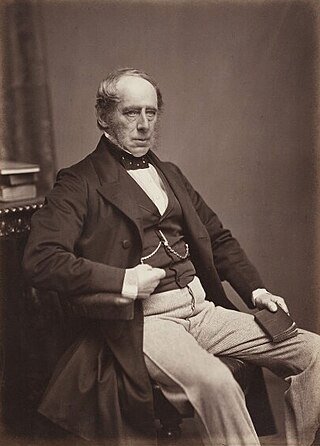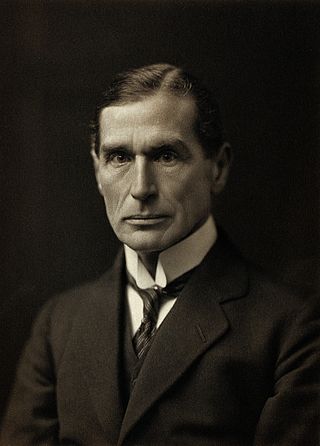
Mary Aline Siepmann CBE, known by the pen name Mary Wesley, was an English novelist. During her career, she was one of Britain's most successful novelists, selling three million copies of her books, including ten bestsellers in the last twenty years of her life.

John Somerset Pakington, 1st Baron Hampton,, known as Sir John Pakington, Bt, from 1846 to 1874, was a British Conservative politician.
The Royal Medical and Chirurgical Society of London (RMCS), created in 1805 as the Medical and Chirurgical Society of London, was a learned society of physicians and surgeons, that received a Royal charter in 1834, and a supplement charter in 1907 to create the newly merged Royal Society of Medicine.

Sir Joseph Fayrer, 1st Baronet KCSI FRS FRSE FRCS FRCP LLD was a British physician who served as Surgeon General in India. He is noted for his writings on medicine, work on public health and his studies particularly on the treatment of snakebite, in India. He was also involved in official investigation on cholera, in which he did not accept the idea, proposed by Robert Koch, of germs as the cause of cholera.
Sir Prescott Gardner Hewett, 1st Baronet, FRCS was a British surgeon, and the son of a Yorkshire country gentleman.

The Royal Society of Medicine (RSM) is a medical society based at 1 Wimpole Street, London, UK. It is a registered charity, with admission through membership.

Bertrand Edward Dawson, 1st Viscount Dawson of Penn, was a physician to the British Royal Family and President of the Royal College of Physicians from 1931 to 1937. He is known for his responsibility in the death of George V, who under his care was surreptitiously injected with a fatal dose of cocaine and morphine to hasten his death, without obtaining any prior patient consent and in contravention of the law at the time, possibly constituting or amounting to murder and high treason.

Sir Edward Farquhar Buzzard, 1st Baronet, was a prominent British physician and Regius Professor of Medicine at the University of Oxford (1928–1943).

Sir Edward Cust, 1st Baronet, KCH was a British soldier, politician and courtier.

Sir Herbert Eustace Maxwell, 7th Baronet, was a Scottish novelist, essayist, artist, antiquarian, horticulturalist, prominent salmon angler and author of books on angling and Conservative politician who sat in the House of Commons from 1880 to 1906.
William Henry Kelson FRCS FZS was an English physician and writer, President of the Hunterian Society, Fellow of the Royal College of Surgeons and of the Zoological Society of London.

Hon. Noël Olivier Richards was an English medical doctor. She was born on Christmas Day 1892, hence her name, as the daughter of Sydney Olivier, 1st Baron Olivier and Margaret Cox. A cousin was the actor Sir Laurence Olivier. She attended the progressive Bedales School in Petersfield, Hampshire. Later she was a member of both the Bloomsbury Group and Rupert Brooke's group of Cambridge Neopagans. For a while, she and Brooke were in a relationship.

Sir D'Arcy Power, was a British surgeon, medical historian, and contributor of some 200 articles on famous surgeons and other related figures to the Dictionary of National Biography.

John Henderson Hunt, Baron Hunt of Fawley was a British general practitioner (GP) who, in 1952, co-founded the College of General Practitioners. In 1967 the royal prefix was approved and the college was renamed the Royal College of General Practitioners (RCGP). He became its president in the same year.

Arthur Henry Cheatle CBE was an English surgeon who made important contributions to understanding of the anatomy and diseases of the mastoid region.
Urban Pritchard was a British otologist who made important contributions to understanding of the organ of Corti.

Sir Henry Morris, 1st Baronet FRCS was a British medical doctor and surgeon, president of the Royal Society of Medicine and the author and editor of significant works on anatomy. He was also known for his work in the field of cancer.
Sir Terence Edward Cawthorne FRCS was a British surgeon specialising in otorhinolaryngology (ENT). He was knighted in 1964.

Arthur Logan Turner FRCSEd FRSE LLD was a Scottish surgeon, who specialised in diseases of ear, nose and throat (ENT) and was one of the first surgeons to work at the purpose-built ENT Pavilion at the Royal Infirmary of Edinburgh. During his surgical career he published a series of clinical papers and wrote a textbook of ENT surgery which proved popular around the world and ran to several editions. After retiring from surgical practice he pursued his interest in the history of medicine writing a biography of his father and histories of the Royal Infirmary of Edinburgh and the University of Edinburgh. As his father had been before him, he was elected President of the Royal College of Surgeons of Edinburgh. His collection of pathological specimens was donated to Surgeon's Hall Museum in Edinburgh..
Alfonso Elkin Cumberbatch FRCS was an ear surgeon and president of the Otological Society of the United Kingdom. At his endorsement in 1907 it merged with the Royal Society of Medicine to became the Section of Otology, on the condition that it remained separated from the specialty of the throat, with the specialty of the nose welcome to join either.














